牛津版高一英语新教材教学心得
- 格式:docx
- 大小:16.72 KB
- 文档页数:5
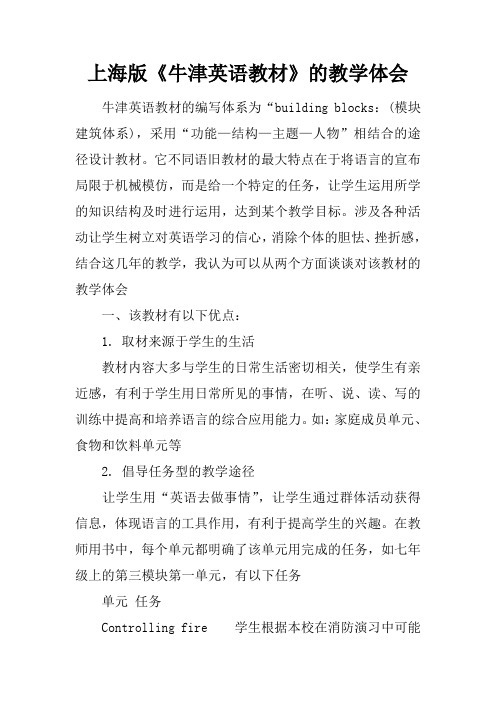
上海版《牛津英语教材》的教学体会牛津英语教材的编写体系为“building blocks:(模块建筑体系),采用“功能—结构—主题—人物”相结合的途径设计教材。
它不同语旧教材的最大特点在于将语言的宣布局限于机械模仿,而是给一个特定的任务,让学生运用所学的知识结构及时进行运用,达到某个教学目标。
涉及各种活动让学生树立对英语学习的信心,消除个体的胆怯、挫折感,结合这几年的教学,我认为可以从两个方面谈谈对该教材的教学体会一、该教材有以下优点:1. 取材来源于学生的生活教材内容大多与学生的日常生活密切相关,使学生有亲近感,有利于学生用日常所见的事情,在听、说、读、写的训练中提高和培养语言的综合应用能力。
如:家庭成员单元、食物和饮料单元等2. 倡导任务型的教学途径让学生用“英语去做事情”,让学生通过群体活动获得信息,体现语言的工具作用,有利于提高学生的兴趣。
在教师用书中,每个单元都明确了该单元用完成的任务,如七年级上的第三模块第一单元,有以下任务单元任务Controlling fire 学生根据本校在消防演习中可能发现的情况,找出学校的防火规则,写出报告学生找出学校的消防用品,并画出楼层平面示意图3. 教材编排有开放性,注意学科间的渗透整套教材考虑到题材和体裁的多样性,练习活泼、开放,如;教材的组织形式有单元式、故事式、循环式。
让语言在不同时间、不同语景都多次出现。
JOBS(工作)刚开始是简单的职业介绍,出现的句型使I want to be a ….等。
随着年级的增高,教材组织形式作适当调整,单元式和故事式相结合,同样的内容在七年级增加了许多句型,多种时态。
4. 配套材料丰富除了学生的课堂用书外,还有教师用书、练习册、语法训练、投影片、录像带等,能使教师全方位运用教材。
特别指出的是活页资料成为教师课堂教学的有利帮手,设计了一系列有利于开展合作学习的调查表格、图片游戏,使课堂练习更有实效。
5. 版式设计活泼,形象生动该教材版面新颖,人物卡通形象生动,,字体变化多样、图表设计和颜色搭配地道,能引起学生的共鸣,激发学习的兴趣。
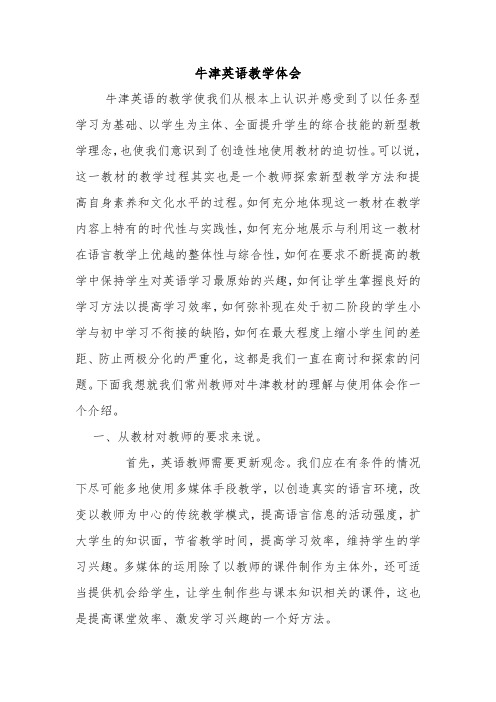
牛津英语教学体会牛津英语的教学使我们从根本上认识并感受到了以任务型学习为基础、以学生为主体、全面提升学生的综合技能的新型教学理念,也使我们意识到了创造性地使用教材的迫切性。
可以说,这一教材的教学过程其实也是一个教师探索新型教学方法和提高自身素养和文化水平的过程。
如何充分地体现这一教材在教学内容上特有的时代性与实践性,如何充分地展示与利用这一教材在语言教学上优越的整体性与综合性,如何在要求不断提高的教学中保持学生对英语学习最原始的兴趣,如何让学生掌握良好的学习方法以提高学习效率,如何弥补现在处于初二阶段的学生小学与初中学习不衔接的缺陷,如何在最大程度上缩小学生间的差距、防止两极分化的严重化,这都是我们一直在商讨和探索的问题。
下面我想就我们常州教师对牛津教材的理解与使用体会作一个介绍。
一、从教材对教师的要求来说。
首先,英语教师需要更新观念。
我们应在有条件的情况下尽可能多地使用多媒体手段教学,以创造真实的语言环境,改变以教师为中心的传统教学模式,提高语言信息的活动强度,扩大学生的知识面,节省教学时间,提高学习效率,维持学生的学习兴趣。
多媒体的运用除了以教师的课件制作为主体外,还可适当提供机会给学生,让学生制作些与课本知识相关的课件,这也是提高课堂效率、激发学习兴趣的一个好方法。
另外,备课组教师一定要加强合作,不断提高集体备课的效果。
备课前应先确定主讲人和讨论内容;备课时,组内老师先明确本单元的主要目标和任务,再由主讲老师提出自己对每一部分教学过程和重点难点的思考,其他老师在此基础上作修改,添补工作。
我们学校在这一过程中,重视教学的过程和重点,但更重视教学的方法,如新单词如何出现,知识点如何讲解,举什么样的事例更能使学生印象深刻。
而这样详细的备课过程往往需要各位老师提前一个星期做准备工作。
常州市同济中学为了提高效率,在前面上课的老师会毫无保留地说出自己的上课心得,以便后面上课的老师在上课时可以做到有的放矢,高效的组织课堂教学,突出重点、分散难点,少走弯路。
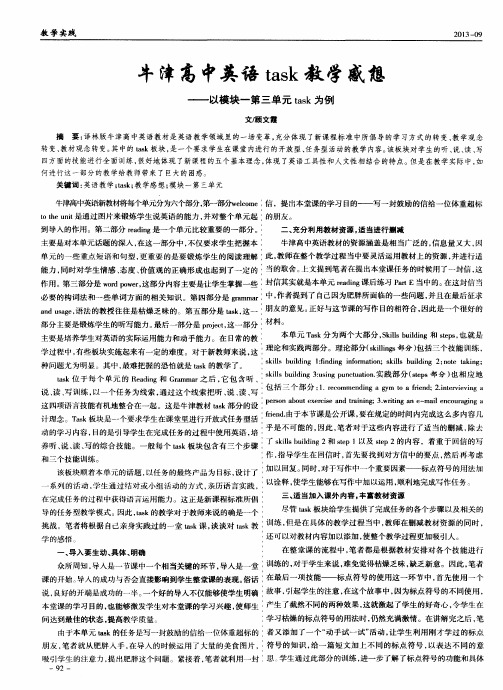
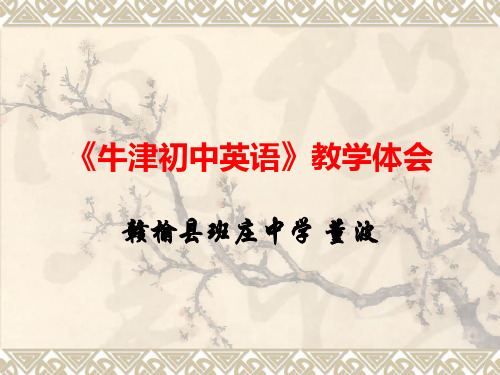

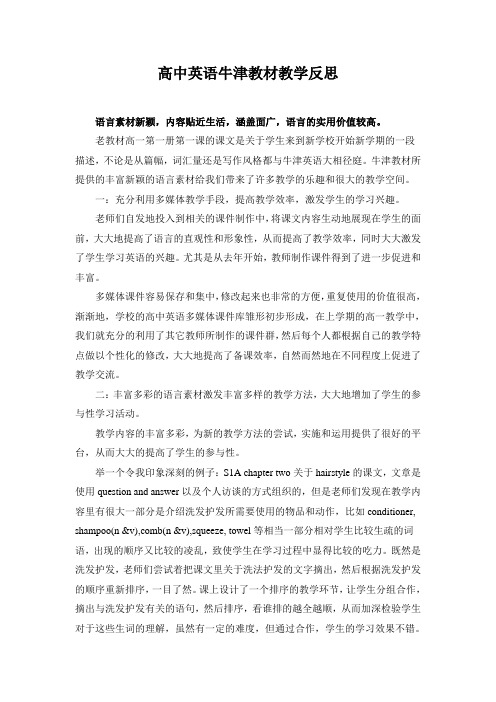
高中英语牛津教材教学反思语言素材新颖,内容贴近生活,涵盖面广,语言的实用价值较高。
老教材高一第一册第一课的课文是关于学生来到新学校开始新学期的一段描述,不论是从篇幅,词汇量还是写作风格都与牛津英语大相径庭。
牛津教材所提供的丰富新颖的语言素材给我们带来了许多教学的乐趣和很大的教学空间。
一:充分利用多媒体教学手段,提高教学效率,激发学生的学习兴趣。
老师们自发地投入到相关的课件制作中,将课文内容生动地展现在学生的面前,大大地提高了语言的直观性和形象性,从而提高了教学效率,同时大大激发了学生学习英语的兴趣。
尤其是从去年开始,教师制作课件得到了进一步促进和丰富。
多媒体课件容易保存和集中,修改起来也非常的方便,重复使用的价值很高,渐渐地,学校的高中英语多媒体课件库雏形初步形成,在上学期的高一教学中,我们就充分的利用了其它教师所制作的课件群,然后每个人都根据自己的教学特点做以个性化的修改,大大地提高了备课效率,自然而然地在不同程度上促进了教学交流。
二:丰富多彩的语言素材激发丰富多样的教学方法,大大地增加了学生的参与性学习活动。
教学内容的丰富多彩,为新的教学方法的尝试,实施和运用提供了很好的平台,从而大大的提高了学生的参与性。
举一个令我印象深刻的例子:S1A chapter two关于hairstyle的课文,文章是使用question and answer以及个人访谈的方式组织的,但是老师们发现在教学内容里有很大一部分是介绍洗发护发所需要使用的物品和动作,比如conditioner, shampoo(n &v),comb(n &v),squeeze, towel等相当一部分相对学生比较生疏的词语,出现的顺序又比较的凌乱,致使学生在学习过程中显得比较的吃力。
既然是洗发护发,老师们尝试着把课文里关于洗法护发的文字摘出,然后根据洗发护发的顺序重新排序,一目了然。
课上设计了一个排序的教学环节,让学生分组合作,摘出与洗发护发有关的语句,然后排序,看谁排的越全越顺,从而加深检验学生对于这些生词的理解,虽然有一定的难度,但通过合作,学生的学习效果不错。
牛津英语教学反思牛津英语教学反思作为一名优秀的人民教师,我们的任务之一就是教学,对教学中的新发现可以写在教学反思中,快来参考教学反思是怎么写的吧!以下是小编整理的牛津英语教学反思,仅供参考,大家一起来看看吧。
牛津英语教学反思1牛津英语第二单元所面对的是入学两周的一年级学生。
由于是初学英语,所以他们的语言积累不多,可以运用的只能是幼儿园或前一单元所学的内容,因此课前的复习必不可少。
学生只有完全掌握了这些单词后,才能顺利地进行后面的词组跟读等练习。
刚入学的学生生性好动,如何让他们在“玩中学”,是上好课的关键。
在Yes or No这个练习中,我要求学生回答时配以一定的动作,如做小兔子表示对,做小猪表示错,增加了练习的童趣,受到学生的欢迎。
在Activity中,我让学生先听数字,用手指表示,然后过渡到听短语,用学习用品来展示。
整个练习中,学生始终处于“动”的状态,而他们这种“动”是围绕授课内容有目的地动,对习得语言起着积极的帮助作用。
Gueing game是最受学生欢迎的活动形式,在这个活动中,答案是否正确已经不再重要,关键是让学生都开口,都得到充分练习的机会。
现代英语教学强调语言的交际性,学习的目的在于交流。
由于我们面对的是初学英语的孩子,让他们马上熟练而完整地用英语表达是不可能的。
因此,我让一位同学看一张图片,图中显示Sam书包里的学习用品,有的是一件,有的是多件,要求学生把自己看到的和简单的英语表达出来,告诉同桌。
对方听到后,把学习用品的数量记录下来,填空完成表格,最后再用英语反馈,从而检查他们是否掌握了学习内容。
这个练习对学生的语言要求不高,学生学得轻松,有利于激发他们学英语、讲英语的热情。
牛津英语教学反思2英语学习、英语教学越来越受到人们的普遍重视。
随着时代的发展和社会的进步,英语已从一种工具变成了一种思想,一种知识库。
没有掌握英语犹如缺乏一种思想,缺少了一个重要的知识源泉。
可以这样说,学会英语,不但多了一双眼睛,一对耳朵,和一条舌头,甚至是多了一个头脑!因为语言是人类思维的工具,认识世界的工具,掌握一种语言也即掌握了一种观察和认识世界的方法和习惯。
牛津英语新教材培训心得体会牛津英语新教材培训心得体会牛津英语新教材培训心得体会深圳市精华学校朱卫连本人有幸参加了为期一天的牛津英语新教材小学英语培训,虽然时间较短,但是我感觉受益匪浅,感受颇深。
下面谈谈通过培训后的一些自己的心得和体会。
培训期间,教研员为我们安排了丰富的内容,包括上海市宝山区教师进修学院陆静娴教师对于教材的剖析与讲解,教师之间的讨论交流等。
她们分别谈了自己对新教材、新理念的一些看法,使我受益非浅,为我今后的教育教学明确了方向,理清了思路。
小学牛津英语课程的主要任务是通过对话、儿歌、故事、游戏等形式,重视英语口语能力的培养。
目标定位在培养学生用英语进行交际的跨文化交往能力,培养学生“国际理解与多元文化”的核心素养,为他们成为面向世界的现代化人才打下必要的基础。
作为一名小学英语教师,我深感肩上责任重大,所以我要及时领会课程的新观念、新特点,新要求,正确认识把握教学目标,调整教学方法和方式,力求在最短的时间内吃透教材,找到感觉。
在此次培训中黄老师和陆老师能深入浅出地分析牛津教材的特点,将本教材的语言知识点作了详细地分析,使得我们对于教材的重点、难点能准确地把握。
语言点通过听说读写模块操练效果清晰可见。
对于讲座我有如下感想:一、新教材课程建设上拓宽了英语学习的渠道,营造了英语的学习环境。
我们的教学必须从课内引申到课外,不要放弃对学生课外阅读的指导。
二、新教材注重语言积累,开发学生潜能,淡化语法,不求系统,但求应用。
这就要求教师决不能把课堂变为自己的“一言堂”,滔滔不绝、口若悬河地展示自己的口才,而要将话语权还给学生,极大地调动学生的发散性思维,强调学生自觉参与,提高学生的感受和表达能力。
要给学生提供尽可能多的语言实践机会。
三、教师要改善学生的学习方式,变过去的“接受性学习”为“接受性、体验性、研究性”学习方式相结合。
其次,我们聆听学习了几位教学经验丰富并在一线教育工作的优秀骨干教师对每一章节的知识点的剖析。
上海版《牛津英语教材》的教学体会上海版《牛津英语教材》的教学体会牛津英语教材的编写体系为 building blocks:,采用功能结构主题人物相结合的途径设计教材。
它不同语旧教材的最大特点在于将语言的宣布局限于机械模仿,而是给一个特定的任务,让学生运用所学的知识结构及时进行运用,达到某个教学目标。
涉及各种活动让学生树立对英语学习的信心,消除个体的胆怯、挫折感,结合这几年的教学,我认为可以从两个方面谈谈对该教材的教学体会一、该教材有以下优点:1. 取材来源于学生的生活教材内容大多与学生的日常生活密切相关,使学生有亲近感,有利于学生用日常所见的事情,在听、说、读、写的训练中提高和培养语言的综合应用能力。
如:家庭成员单元、食物和饮料单元等2. 倡导任务型的教学途径让学生用英语去做事情,让学生通过群体活动获得信息,体现语言的工具作用,有利于提高学生的兴趣。
在教师用书中,每个单元都明确了该单元用完成的任务,如七年级上的第三模块第一单元,有以下任务单元任务Controlling fire 学生根据本校在消防演习中可能发现的情况,找出学校的防火规则,写出报告学生找出学校的消防用品,并画出楼层平面示意图3. 教材编排有开放性,注意学科间的渗透整套教材考虑到题材和体裁的多样性,练习活泼、开放,如;教材的组织形式有单元式、故事式、循环式。
让语言在不同时间、不同语景都多次出现。
JOBS刚开始是简单的职业介绍,出现的句型使I want to be a .等。
随着年级的增高,教材组织形式作适当调整,单元式和故事式相结合,同样的内容在七年级增加了许多句型,多种时态。
4. 配套材料丰富除了学生的课堂用书外,还有教师用书、练习册、语法训练、投影片、录像带等,能使教师全方位运用教材。
特别指出的是活页资料成为教师课堂教学的有利帮手,设计了一系列有利于开展合作学习的调查表格、图片游戏,使课堂练习更有实效。
5. 版式设计活泼,形象生动该教材版面新颖,人物卡通形象生动,,字体变化多样、图表设计和颜色搭配地道,能引起学生的共鸣,激发学习的兴趣。
上海版《牛津英语教材》的教学体会各位读友大家好,此文档由网络收集而来,欢迎您下载,谢谢牛津英语教材的编写体系为“building blocks:(模块建筑体系),采用“功能—结构—主题—人物”相结合的途径设计教材。
它不同语旧教材的最大特点在于将语言的宣布局限于机械模仿,而是给一个特定的任务,让学生运用所学的知识结构及时进行运用,达到某个教学目标。
涉及各种活动让学生树立对英语学习的信心,消除个体的胆怯、挫折感,结合这几年的教学,我认为可以从两个方面谈谈对该教材的教学体会一、该教材有以下优点:1. 取材来源于学生的生活教材内容大多与学生的日常生活密切相关,使学生有亲近感,有利于学生用日常所见的事情,在听、说、读、写的训练中提高和培养语言的综合应用能力。
如:家庭成员单元、食物和饮料单元等2. 倡导任务型的教学途径让学生用“英语去做事情”,让学生通过群体活动获得信息,体现语言的工具作用,有利于提高学生的兴趣。
在教师用书中,每个单元都明确了该单元用完成的任务,如七年级上的第三模块第一单元,有以下任务单元任务学生根据本校在消防演习中可能发现的情况,找出学校的防火规则,写出报告学生找出学校的消防用品,并画出楼层平面示意图3. 教材编排有开放性,注意学科间的渗透整套教材考虑到题材和体裁的多样性,练习活泼、开放,如;教材的组织形式有单元式、故事式、循环式。
让语言在不同时间、不同语景都多次出现。
JOBS(工作)刚开始是简单的职业介绍,出现的句型使I want to be a ….等。
随着年级的增高,教材组织形式作适当调整,单元式和故事式相结合,同样的内容在七年级增加了许多句型,多种时态。
4. 配套材料丰富除了学生的课堂用书外,还有教师用书、练习册、语法训练、投影片、录像带等,能使教师全方位运用教材。
特别指出的是活页资料成为教师课堂教学的有利帮手,设计了一系列有利于开展合作学习的调查表格、图片游戏,使课堂练习更有实效。
文档从网络中收集,已重新整理排版.word版本可编辑.欢迎下载支持.
1word版本可编辑.欢迎下载支持.
牛津版高一英语新教材教学心得
自使用新教材以来,我们感触颇多,有喜有忧。由于本
届学生在初中使用的并不是这一系列的牛津教材,因此教材
体系的不衔接,给我们教师在教学中和学生在学习的过程中
面临了很多挑战。
首先: 词汇方面
一、 牛津版教材里词汇相当丰富,因此给学生在学习
时带来了很大困难。有些生词他们学过了,有些他们没有学
过 ;同时教材中经常会出现很多词汇表上没有列出的单词。
二、 课本中出现的某些词或词组在教参上的讲解应该
说相当全面但是有一些高于学生的理解能力。这就要求我们
教师在教学过程中做到心中有数,有的放矢。
做法:1. 在预习的时候让学生自己先找出不认识的单
词。
2 .我们根据词的使用频率把生词分成两种:识记和运
用 。不同的单词给学生提出不同的要求。在情境中教学,
让学生学会去猜测单词的意思。
3 . 教学生记忆单词的方法,了解构词法,提高记单词
的效率。
4 . 在讲解的过程中,我避免面面俱到而忽略了突出基
础和重点。注重词的基本含义和惯用法,通过词组、句型、
句子来理解、记忆和运用句子。
文档从网络中收集,已重新整理排版.word版本可编辑.欢迎下载支持.
2word版本可编辑.欢迎下载支持.
5 .经常、反复默写。一个单元的跨度时间长,给我们
教师和学生有足够的时间把相应的单词、词组和课文中出现
的好的句子掌握。
一个阶段下来,我很高兴地看到学生在新教材的使用过
程中学习到了很多词汇,并能够运用到句子里去。
其次: 教学内容和板块设计方面
这套教材内容相当丰富,并且在不同的板块之中贯穿始
终。由于教学容量大,我们觉得有时很难按时完成课堂教学
任务。我们觉得有些板块对学生的帮助相当大。比如 word
power 部分帮助学生了解词汇的运用并扩充了相当多的词
汇;Grammar 部分让学生循序渐进地学习枯燥的语法;task
和project部分让学生掌握运用英语的技巧并进行实际操练。
因此在把握教材上,给我们教师提出了很高的要求,我们应
该在了解学生的基础上,把握好内容的起点和设计好课堂容
量,并根据不同的教学内容采用恰当的教学方法,注重师生
在课堂中的互动。
做法:1 集体备课,认真研究教材内容,并根据学生实
际制定教学目标,重点和难点,设计相应的教案、学案和练
习。并适时地运用多媒体。
2 在整个英语教学过程中,让学生尽可能地多参与活动。
如在课前布置相关内容,让学生进行预习,在课堂上安排一
定的课堂活动,让学生就某个话题进行讨论;课后让学生进
文档从网络中收集,已重新整理排版.word版本可编辑.欢迎下载支持.
3word版本可编辑.欢迎下载支持.
行一定的复习与巩固并完成与教学内容相关的练习如同步
听力、同步阅读等
3 在一单元结束后,进行一单元的测试,从词、词组、
句型等方面和在听说读写方面系统地让学生复习。
在这个阶段教学下来,虽然我们觉得备课量比以前大,
课堂容量也没以前多, 但是相对地学生的活动比以前多了,
学生参与教学活动也有一定的积极性。
最后:在学生的学习习惯方面
高中英语教学中做好学法指导十分重要,要指导学生预
习、听课、记笔记、完成作业、及时复习总结的方法。高中
学习和初中学习有大的差距。大部分初中学生的学习自主性
较差,自学能力较弱,教师说什么才做什么;进入高中后,
有些学生还是在用初中时的学习方式,缺乏主动性,因而我
们要对学生严格要求并进行学习方法的指导,培养他们良好
的学习习惯。
做法:
1. 培养朗读和交际的习惯。高一新生来自不同学校,
由于客观条件限制,他们的语音、语调有待提高。每天的早
读课以及课堂上都要坚持进行朗读训练。把大声朗读和默读
有机地结合起来。从熟读向交际过渡,形成良好的读与说的
习惯,为说好英语奠定基础。
2. 培养良好的上课习惯,学会听课和记笔记。上课是
文档从网络中收集,已重新整理排版.word版本可编辑.欢迎下载支持.
4word版本可编辑.欢迎下载支持.
教学过程中非常重要的一个环节。很多学生在上课过程中,
只是很被动地坐在那听,不积极思考。既不能积极主动地参
与课堂活动,对于重要的知识点也不会及时记录,或者不经
选择地把课上老师提到的所有知识点都记录下来,导致上课
效率不高。让学生在理解的基础之上,有选择地记笔记。并
要求学生在课后整理笔记,再次巩固课堂教学内容。
3. 培养良好的复习习惯。上课的效果是否能得到巩固,
关键就是课后能否及时去复习。每天得花一定的时间把当天
所讲内容结合笔记进行复习,并做一定相关的习题来巩固。
在一定的周期要进行整体复习,比如一个星期,两个星期等
等。帮助学生进行阶段练习与巩固,并进行归纳、总结,找
出不足。让学生把自己平时容易错的单词、题目摘抄下来,
经常去看,以免再犯
4. 培养良好的作业习惯和工整书写的习惯。以往在批
阅学生的书面表达时,常有这样的体会:学生字迹潦草,书
写不规范,批阅起来很费劲。所以一开始我们觉得强调规范
的书写是非常必要的。而且在平时的作业中要求学生独立、
按时完成。
经过一段时间下来,我们觉得大部分学生已经慢慢地养
成了良好的学习习惯。并且在学习上有了一定进步。
总之,抓好高一英语起始教学很重要。在教学过程中我
们觉得在体现新教材教学理念的同时,也培养了学生运用英
文档从网络中收集,已重新整理排版.word版本可编辑.欢迎下载支持.
5word版本可编辑.欢迎下载支持.
语的能力。我们相信只要让学生打好扎实的基础,对他们严
格要求,持之以恒,以不变应万变,我们就一定能面对新教
材给我们的挑战。